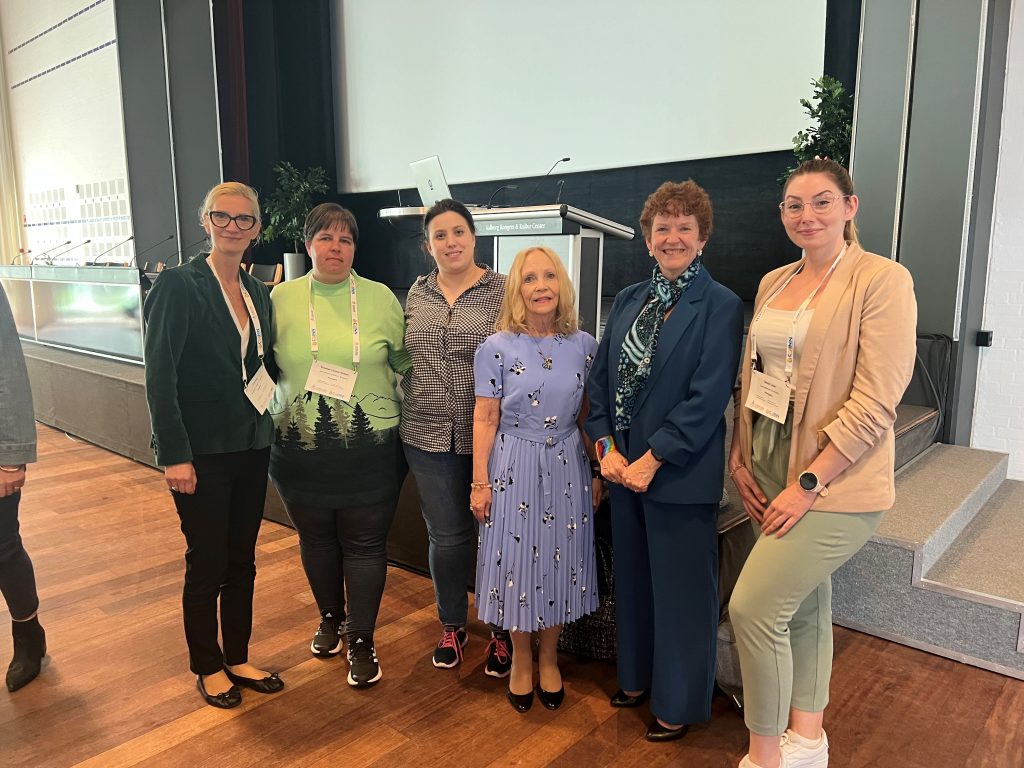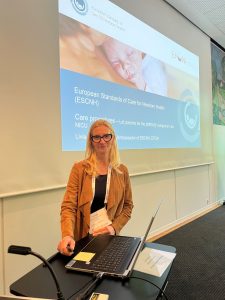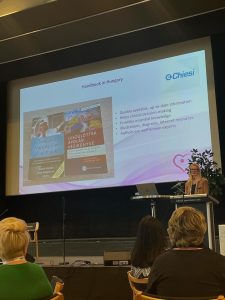2024-05-28 / News
A guest article by ESCNH Ambassador Livia Nagy Bonnard

© Livia Nagy Bonnard
I felt honoured and proud when the representative of the Council of International Neonatal Nurses (COINN) Helle Lønstrup Haslund-Thomsen approached me and offered me the opportunity to open the bi-annual COINN conference in Aalborg, Denmark, this year. My first surprise and question was: what could I possibly contribute, since I am currently not working as a bedside nurse? I can only share what kind of care we – as parents of a preterm born son – experienced, and what I disliked during our NICU stay. Their answer was: „This is exactly what we are looking for. You can speak both from your perspective as a former nurse and as a mother who lived through this traumatic situation”.
I was sceptical, even afraid of the task. I was not sure they would understand my thoughts and hoped they would not misunderstood me or take it as an attack, since they have enough problems in their daily clinical reality. Today, one of the cores values in neonatal nursing is facilitating infant- and family-centred developmental care (IFCDC) to support the closeness – both physical and emotional – between the newborn and the parents, siblings or extended family. But are the professionals getting all the help they need to provide this? Do they get enough training, supervision, support, and appreciation to achieve this?
My nursing education started in the late 80s, and I quickly experienced all the bliss and challenges of working in the healthcare system. I worked in intensive care with adult cardiac patients, but I always loved taking care of those too-early and wise mini adults whose cronic disease made them grow too fast. The „drive” to become a nurse came from my family; somehow it was „obvious” I was continuing the family path. But just like today, enthusiasm and dedication to paediatric care alone was not enough to keep a young healthcare professional to the bedside. I felt undervalued and underpaid, which drove me in a different direction.
Every road led to the NICU. Today, I know it was my destiny, but two decades ago, I found myself all of a sudden on the other side of the patient bed, as a mother with an extremely preterm baby, and the NICU was the last place I wanted to be. Today I know, as research backs me up, what to advocate for as a patient expert, and most importantly, how to do it. But 18 years ago, I found myself in a ward what I could not even imagine or have professional experience with because, in the late 80s and early 90s, Hungarian neonatal care was still in its infancy. Today we know – I know – that every aspect of care affects the brain and we have to protect the brain of every preterm baby. However, when I look at all the evidence and all the the consequences we have to live with for the rest of our lives, I feel sad. I wish I knew back then…
Today I know it was the best decision to open up my heart (and the family photo book) to share our lived experience with colleagues from around the world. My son received outdated, non-evidence-based neonatal care during his 14-week stay 18 years ago. I had two 20-minute visits a day to see my baby. I could only look at him, and I had to ask permission even to touch him or take a picture of him. The main reason given was to avoid infection. I imagined myself as a biological bomb; that idea was planted in my head from the first moment I set foot in the NICU and it went on for 14 weeks. I was afraid to kiss my own child for a year, and did not let anyone touch him. They gave formula milk to my baby as my breast milk became less very quickly, due to the stress and misleading information. He received cluster care where his sleep cycles, pain, and stress were ignored. He was positioned on his back in his incubator, without any support for his shoulders, legs, or knees.
How can a parent become part of the care procedures? What type of information does a parent need to dare to dream of taking that baby home one day from intensive care? Why is the first touch so important, and how can we guide a parent to observe and watch their baby? How can something as simple as the smell of a baby support attachment? And: How can nurses make parents feel welcome at the NICU?
Thanks to COINN, I had the opportunity to attend one of the most memorable and comprehensive professional conferences of my life, where the speakers touched on the most important issues facing neonatal nurses. In addition to pain management, we heard many international examples of parental involvement. I watched in awe as my young colleagues presented their latest research in different areas of neonatal nursing. To my great pleasure, the ESCNH project initiated by EFCNI was also featured several times during the presentations, covering NICU design, Nutrition, Patient safety & hygiene practice, and pain management. I am proud that the nurses find those standards, which are co-created by parents and patients, useful and apply them in their everyday care.

© Livia Nagy Bonnard
Of course, a recurring theme of the conference was how to attract more young people into nursing and how to keep nurses at the bedside. How can we support them and prevent burnout? We know that NICU babies are healed by nurses, whose careful and gentle care is the foundation for a healthy future for our children. Today, what the nursing profession needs most is our support to stand up for them.
I was proud to show how, in my tiny country of Hungary, we are helping neonatal nurses through training (e.g., FINE: Family and Infant Neurodevelopmental Education) and support programmes for their mental health. We advocate for them at the governmental level and help their education, e.g. through the translation and publication of the Neonatal Nursing Care Handbook written by Judy Wright Lott and Carole Kenner (former COINN president).

© Livia Nagy Bonnard
During this conference, I had the opportunity to provide all the guidance I could, showing how to avoid the pitfalls that can create challenges for preterm born babies and their families. I feel like I succeeded because, for three days, almost all of the nearly 300 participants approached me, even if it was just for a word or a hug, and thanked me for my sincere thoughts. I felt heard, and that they had understood what parents need to have the best NICU experience possible.
I once read this quote: „Once a nurse, always a nurse. No matter where you go or what you do, you can never truly get out of nursing. It’s like the Mafia… you know too much”. And it is absolutely true. I’m proud to be part of this family.
You are currently viewing a placeholder content from Facebook. To access the actual content, click the button below. Please note that doing so will share data with third-party providers.
More InformationYou are currently viewing a placeholder content from Instagram. To access the actual content, click the button below. Please note that doing so will share data with third-party providers.
More InformationYou are currently viewing a placeholder content from X. To access the actual content, click the button below. Please note that doing so will share data with third-party providers.
More Information